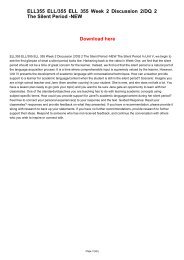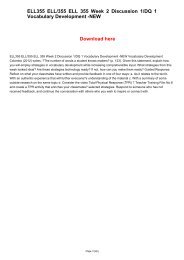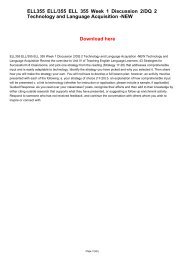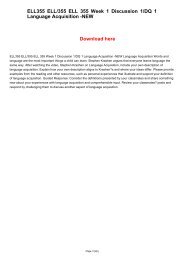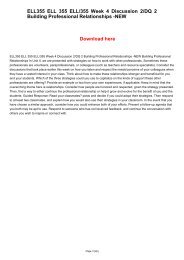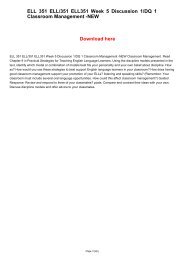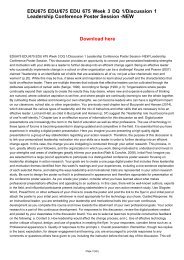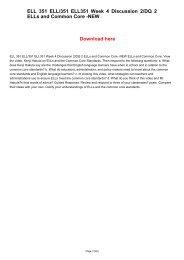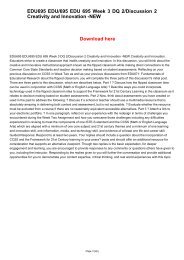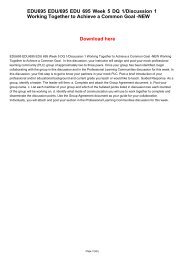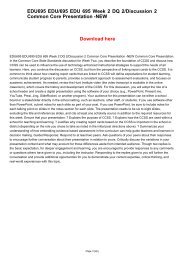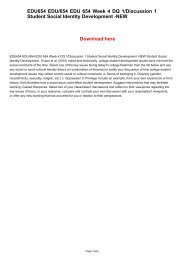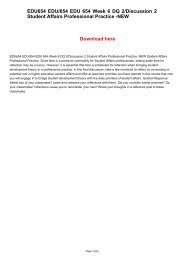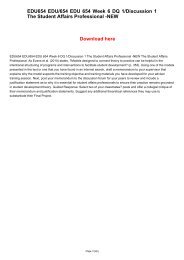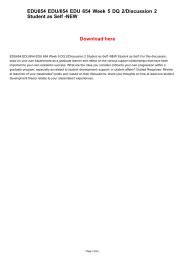EDU 321 EDU321 EDU/321 Week 5 Discussion 1/DQ 1 Case Study Bianca -NEW
EDU 321 EDU321 EDU/321 Week 5 Discussion 1/DQ 1 Case Study Bianca -NEW
EDU 321 EDU321 EDU/321 Week 5 Discussion 1/DQ 1 Case Study Bianca -NEW
- No tags were found...
You also want an ePaper? Increase the reach of your titles
YUMPU automatically turns print PDFs into web optimized ePapers that Google loves.
<strong>EDU</strong> <strong>321</strong> <strong>EDU</strong>/<strong>321</strong> <strong>EDU</strong><strong>321</strong> <strong>Week</strong> 5 <strong>Discussion</strong> 1/<strong>DQ</strong> 1<br />
<strong>Case</strong> <strong>Study</strong> <strong>Bianca</strong> -<strong>NEW</strong><br />
Download here<br />
<strong>EDU</strong> <strong>321</strong> <strong>EDU</strong>/<strong>321</strong> <strong>EDU</strong><strong>321</strong> <strong>Week</strong> 5 <strong>Discussion</strong> 1/<strong>DQ</strong> 1 <strong>Case</strong> <strong>Study</strong> <strong>Bianca</strong> -<strong>NEW</strong> <strong>Case</strong> <strong>Study</strong>: <strong>Bianca</strong> - <strong>Bianca</strong> is an<br />
eight year old who was orphaned by a devastating tsunami in Indonesia at the age of five. <strong>Bianca</strong> was recently adopted<br />
by an English-speaking family in Indiana and enrolled in third grade at James Madison Elementary. Her native language<br />
is Bahasa Indonesia and her adopted family only speaks limited phrases of this language. Prior to coming to James<br />
Madison Elementary, <strong>Bianca</strong>?s education has been sporadic. Therefore, she is considered a Student Interrupted Formal<br />
Education (SIFE) due to missing one to two years of formal education. As a result, her English language development is<br />
limited, making it difficult to participate in grade-appropriate classroom tasks. The program for English Language<br />
Learners at James Madison Elementary is English Language Development (ELD). <strong>Bianca</strong> is in a traditional third grade<br />
classroom and receives support from an ESL teacher (English as second language) for thirty minutes twice a week. Her<br />
teacher, Mrs. Perkins, is concerned because <strong>Bianca</strong> has made limited progress over the past three months and is<br />
considered at the early production stage of second language development (see Chapter 4). During a parent-teacher<br />
conference, Mrs. Perkins spoke with <strong>Bianca</strong>?s parents concerning her language struggle and academic progress. She is<br />
considering referring <strong>Bianca</strong> for testing to determine if she has a specific learning disability. <strong>Bianca</strong>?s parents fear<br />
labeling their young daughter and think she will catch up once she becomes proficient in English. They have asked Mrs.<br />
Perkins for additional intervention strategies before agreeing to assess for a specific learning disability. Mrs. Perkins has<br />
very little training in how to properly support the ELL students in her class; therefore, her classroom tasks tend to be<br />
appropriate for native English-speaking third graders. Mrs. Perkins reflects on her learning objective tomorrow where<br />
students will be expected define the parts of a plant: roots, stem, leaves, and flower. In your discussion, consider the<br />
following questions: ? Do you feel testing for a specific learning disability is the appropriate next step? Why or why not?<br />
Refer to Chapter 1.4 of your text to support your response. ? Review Chapter 9.2 of your text titled ?Assessing,<br />
Activating, and Building Background.? How might you tell Mrs. Perkins how to assess the knowledge <strong>Bianca</strong> might<br />
already have about the parts of a plant. Why is it important to assess what students already know about a subject and<br />
how could it help with <strong>Bianca</strong>?s English language proficiency? ? Review Chapter 9.3 of your text. Develop four<br />
strategies that Mrs. Perkins could integrate within her plant lesson plan to develop skills in all four language and literacy<br />
domains (listening, speaking, reading and writing). Describe how these four strategies would support the English<br />
language development of <strong>Bianca</strong>. ? Review Chapter 9.5 of your text. How might Mrs. Perkins integrate technology within<br />
her lesson plan and how would it support <strong>Bianca</strong>? ? What affective (emotional) issues may be impacting <strong>Bianca</strong>?s ability<br />
to progress in acquiring the English language. You may want to refer to Chapter 1 in addition to Chapter 4, Section 4.3<br />
of your text for support in responding to this question. Be sure to use the text to support your response. Guided<br />
Response: Respond to at least two of your classmate?s postings. Evaluate their strategies for integrating the four<br />
language and literacy domains within the lesson on the parts of a plant and make any additional recommendations.<br />
Please respond to any questions posted by your instructor.<br />
Page 1/{nb}




